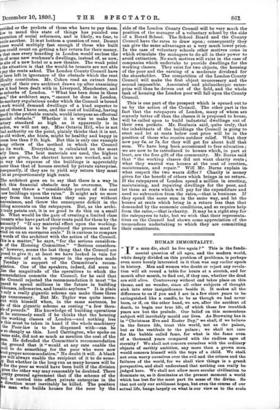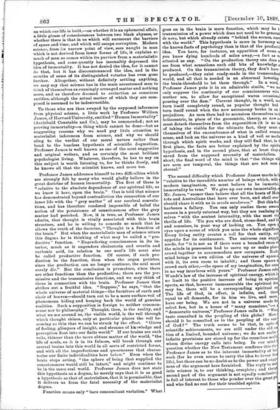HUMAN IMMORTALITY.
" IF a man die, shall he live again ? " This is the funda- mental question of all ages, and the modern world, while deeply divided on this problem of problems, is perhapa even more keenly interested in it than was any earlier epoch in history. Men and women who doubt or reject any revela- tion will sit round a table for hours at a stretch, and for month after month, to find out, if they can, whether the dead. are still alive. Controversy without end takes place on this- theme, and no wonder, since all other subjects of thought. sink into utter insignificance beside it. It makes all the- difference to us if you and I are in a few short years to be extinguished like a candle, to be as though we had never been, or if, on the other band, we are, after the accident of- death, to begin our true life, of which these few troubled. years are but the prelude. Our belief on this momentous. subject will inevitably mould our lives. As Browning has it. in "Christmas Eve and Easter Day," we shall, if we believe, in the future life, treat this world, not as the palace, but as the vestibule to the palace ; we shall not care for the babble called fame, for what is the fame even of a thousand years compared with the endless ages of eternity ? We shall not concern ourselves with the ordinary objects of earthly ambition, any more than a grown man would concern himself with the toys of a child. We shall not even worry ourselves over the evil and the crimes and the failures of the world, for we shall view things in a grand perspective, and shall understand that nothing can really be judged here. We shall not allow mere secular civilisation to dominate us, as it dominates at the present moment a world which has lost for the most part its sense of the divine. So that not only our sublimest hopes, but even the course of our actual life, hangs largely on what is our view as to the scale
on which our life is built,—on whether it is an ephemeral affair, a little gleam of consciousness between two black abysses, or whether there is that in us which will surmount the barriers of space and time, and which will escape corruption. Modern science, from its narrow point of view, sees naught in man which is not derived from lower forms of life, it explains so much of man as comes within its purview from a materialistic hypothesis, and consequently has insensibly depressed the idea of immortality. It has not denied the idea, for it cannot do that, but it has discountenanced the idea, and in the mouths of some of its distinguished votaries has even gone further. Altogether, without definitely settling anything, we may say that science has in the main accustomed men to think of themselves as cunningly arranged matter and nothing more, and as therefore doomed to extinction as conscious entities, although the actual matter of which they are com- posed is assumed to be indestructible.
To those who are thus swayed by the supposed inferences from physical science, a little work by Professor William James, of Harvard University, entitled " Human Immortality" (Archibald Constable and Co.), may be commended ; not as proving immortality—a thing which cannot be done—but as suggesting reasons why we need pay little attention to materialist inferences from science, and why we should cling to the verdict of our moral nature rather than bend to the baseless hypothesis of scientific dogmatism. Professor James is well known as one of the most suggestive and original writers, and as certainly the most brilliant psychologist living. Whatever, therefore, he has to say on this subject is worth listening to, for he thinks freely, and he knows all that the scientist knows, and more too.
Professor James addresses himself to two difficulties which are strongly felt by many who would gladly believe in the great doctrine of human immortality. The first of these is "relative to the absolute dependence of our spiritual life, as we know it here, upon the brain." One is told that science has demonstrated beyond contradiction the connection of our inner life with the " grey matter " of our cerebral convolu- tions, and has therefore rendered impossible of belief the notion of the persistence of consciousness after the grey matter had perished. Now, it is true, as Professor James admits, that thought is vitally associated with this brain structure, and he is willing to concede so much that he allows the truth of the doctrine, " Thought is a function of the brain." But when the materialistic man of science utters this dogma he is thinking of what may be called a " pro- ductive" function. "Engendering consciousness in its in- terior, much as it engenders cholesterin and creatin and carbonic acid, its relation to our soul's life must also be called productive function. Of coarse, if such pro- duction be the function, then when the organ perishes, since the production can no longer continue, the soul must surely die." But the conclusion is premature, since there are other functions than the productive ; there are the per- missive and the transmissive functions, and we may think of these in connection with the brain. Professor James then strikes out a fruitful idea. "Suppose," he says, "that the whole universe of material things—the furniture of earth and choir of heaven—should turn out to be a mere surface-veil of phenomena hiding and keeping back the world of genuine realities. Such a supposition is foreign to neither common- sense nor to philosophy." Thought, then, is the reality, and what we see around us, the visible world, is the veil through which thought shines, only at particular places the veil be- coming so thin that we can be struck by the effect. " Glows of feeling, glimpses of insight, and streams of kn)wledge and perception float into our finite world." If our brains are such veils, thinner than the more obtuse matter of the world, "the life of souls, as it is in its fulness, will break through our several brains into this world in all sorts of restricted forms, and with all the imperfections and queernesses that charac- terise our finite individualities here below." Even when the brain stops acting, " the sphere of being that supplied the consciousness would still be intact," and might continue to be in the more real world. Professor James does not state this hypothesis as a dogma, he merely says that it is as good a hypothesis as that of materialism, that it is permissible, that it delivers us from the fatal necessity of the materialist dogma.
Function means only " bare concomitant variation." What
goes on in the brain is mere function, which may be transmission of a power which does not need to be gener de novo, but which already exists " behind the scenes, co with the world." This hypothesis is more in harmony the known facts of psychology than is that of the produe idea. You have, for instance, an apparition of some you know dying hundreds of miles away,—a fact as attested as any. " On the production theory one does see from what sensations such odd bits of knowledge produced. On the transmission theory, they don't haw be prodaced,—they exist ready-made in the transcendm world, and all that is needed is an abnormal lowerini the brain-threshold to let them through." In a word Professor James puts it in an admirable simile, "we n only suppose the continuity of our consciousness witl mother sea, to allow for exceptional waves occasiom pouring over the dam." Current thought, in a word, to turn itself completely round, as popular thought had turn itself round when the new astronomy broke in on prejudices. As men then had to accustom themselves to heliocentric, in place of the geocentric, theory, so now I must detach themselves from the superstition (it is no 11 of taking the visible for the ultimate fact, they must themselves of the encumbrance of what is called comm sense, and look on the universe as a kind of veil or medi through which spirit works, and they will find that, in first place, the facts are better explained by the spirit hypothesis, and in the second place, that at least they saved from the supposed necessity of materialism. short, the final word of the mind is that "the things wl) are seen are temporal, the things that are not seen eternal."
The second difficulty which Professor James meets is ti "relative to the incredible number of beings which, with a modern imagination, we must believe to be immortal, immortality be true." We give up our own immortality, Mr. James, " sooner than believe that all the hosts of Ho tots and Australians that have ever been, and shall ever should share it with us in secula secular um." But this feel harbours a fallacy. You can only realise these swat, masses in a purely external way, but they are realising tb selves " with the acutest internality, with the most vio thrills of life. 'Tie you who are dead, stone-dead, and b and senseless, in your way of looking on. You open y eyes upon a scene of which you miss the whole significan Every living entity creates a call for that entity, and appetite for its continuance. The universe can supply needs, for "it is not as if there were a bounded room w the minds in possession had to move up or make plane crowd together to accommodate new occupants. Each mind brings its own edition of the universe of space with it, its own room to inhabit; and these spaces n crowd each other,—the space of my imagination, for exa in no way interferes with yours." Professor James refe Wandt's law of the increase of spiritual energy, which I no limit to the positive increase of being in spiritual spects, so that, however immeasurable the spiritual de may be, there will be a corresponding spiritual so The life of God, in effect, is infinite, and, thee' equal to all demands, for in him we live, and move, have our being. We are not in a universe made for select few, but in a house of " many mansions,"—a "democratic universe," Professor James calls it. "Was taste consulted in the peopling of this globe? How, should it be consulted as to the peopling of the vast of God ? " The truth seems to be that, in spite scientific achievements, we are still under the old tion of a limited, bounded universe ; we do not realise infinite provisions are stored up for the countless multi' whom divine energy calls into being. In our mind i question whether the New Testament confirms this thee Professor James as to the inherent immortality of bei such (for he even seems to carry the idea to lower for' life), bat there can be no doubt as to the power and sugg ness of the argument here furnished. The reply to ma istic science is, to our thinking, complete ; and thou second part of the argument is not equally conclusive, is full of interest to those who ponder over the great p and who find no rest for their troubled spirits.











































 Previous page
Previous page